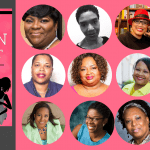For #Authors: How to Increase Your Social Media Visibility
As an author you may have found social media to be incredibly frustrating. Social media can feel like you’re out in the wild, wild West fighting to get visibility. Especially when you have the largest social networks constantly playing with their algorithms and also since most of them really want you to pay for that visibility via promoted ads.
Many authors spend a lot time posting “Buy My Book, Buy My Book” messages on Facebook or Twitter, making it obvious they’re more interested in getting the sales and/or commission than developing relationships. This can be a turn off to a potential reader and quite frankly as an author, posting these posts myself have made me cringe. We have to market, but there are better ways. Let’s look at three ways below.
(1) Engage with Readers
Relationship building and consistency are key elements to social media marketing. It’s really hard to keep momentum going if you’re not engaged.
Social networks are a part of most of our daily routines. If you have a smartphone or a tablet it’s super easy (sometimes too easy) to stay plugged into news feeds and timelines. These are “social” networks and we have to remember people want to know you and they definitely want YOU to acknowledge them. Whenever a reader leaves a comment on any social network, I make it my business to respond as soon as I can.
Authors should make it a point to be transparent, as comfortably appropriate (don’t run readers off) and bring the readers inside their world a bit. Take the time to not only create, but build an online community where you can engage with readers. In a recent post, I talked about engaging readers on Facebook.
Cool down on the automation.
I know, I know … I have to remind myself this sometimes too. It’s nice having tools like Hootsuite or BufferApp for scheduling posts, but take the time to start conversations on a regular basis. Taking the time to “like” or even better … comment …. makes a huge difference.
You can increase your visibility with readers by JUST being available. It will make it easier for people to connect to you and look forward to the books you release in the future.
So, how do I start a conversation?
Good question!
Ask readers their thoughts about certain characters. If you’re writing a series, ask readers what they think should happen next. I’m not saying readers should dictate what you write, but find a way to generate some excitement for your books with them.
In my cozy mystery at series, Eugeena Patterson is a a baby boomer widow who has a budding romance with her neighbor and co-detective, Amos Jones. Most of my readers have no problem telling me these two definitely need to become a lot closer in the next book. I find this fun and informative that readers are invested in these characters.
(2) Focus on Quality, Not Quantity
Some authors get caught in the number of followers, friends, etc. Anytime you connect, follow or friend a person on social media, you need to keep in mind quality over quantity. You can have 10,000 people following you on Twitter, but if they’re not tuned into your tweets on Twitter, those numbers don’t mean much.
Now if you have people in a Twitter list that you engage with daily or if you participate weekly in a Twitter Chat, more than likely you will develop a solid relationship with some potential book supporters.
You may have 1000 people like your Facebook business or fan page, but the changes over the past few years in Facebook’s algorithm almost forces you to spend money. Not that this is bad. For as little as $5 a day, you can get a pretty good reach. Still, engagement will help with that budget so you’re not always relying on boosting a post.
Are you really paying attention?
I have noticed I have a core group of readers who always respond. These readers over the past few years have become my influencers (or street team). Among this group are book reviewers who have been willingly to post reviews on their blog, on Amazon and Goodreads. I focus on them with every new release because their word of mouth is highly important to me.
(3) Analyze What Didn’t Work
Finally, I have to ask.
Have you thrown your hands up in despair and decided to quit the whole book marketing thing? Be honest. I have on many occassions. Marketing is time-consuming!
Marketing a book feels like a full-time job. I have book releases where I clearly didn’t put in the work for various reason, usually due to life happening at precisely the same time. Guess what? Life won!
Still, there usually was something that I could have done differently.
The business of writing involves some analysis. Most businesses have to do this and as an author you should too. If you keep doing the same thing over and over with no results, that’s a problem. Instead of getting frustrated and quitting, pinpoint the issues.
It is really important to understand the social network platform you’re using so you’re not wasting time. For example, LinkedIn is more of professional network and posting the same content that you do on Facebook or Pinterest may not be a good idea.
It may be really helpful for you to create a spreadsheet or use your favorite document to start a log of your marketing activities. For at least a month, really study your marketing effort results.
Here are popular social networks and how we may seek to gain attention for our books.
- Facebook: likes, comments, shares
- Twitter: retweets, favorites, mentions
- Pinterest: repins, like, comment
- Instagram: like, comment, reposts
- Contests and giveaways: how many entries
- Mailing list: sign ups (Have you read Authors, Are you building a mailing list?)
I encourage you to dig even deeper and look at analytics like:
- Google Analytics (essential for all websites)
- Facebook Insights (login into Facebook, this should show all your business pages)
- Twitter Analytics (log into Twitter)
- Pinterest Analytics (log into Pinterest)
If you’re using social media tools like BufferApp or Hootsuite, take the time to see what received clicks and what flat out didn’t work. You may want to invest a bit more money into these tools to receive deeper analytics.
DO REMEMBER social media is mainly about exposure so concentrate on making your visibility a positive experience. The more people have a positive interaction with you, the more likely their social interaction could equal a sale(s).
Tyora Moody is the author of Soul-Searching Mysteries, which includes cozy mystery, women sleuth mystery, and mystery romance under the Christian Fiction genre. Her books include the Eugeena Patterson Mysteries, Serena Manchester Mysteries, Reed Family Mysteries, and the Victory Gospel Family Series.
When Tyora isn’t working for a literary client, she’s either loving on her cats, listening to an audiobook or podcast, binge-watching crime shows or Marvel movies, and of course, thinking about the next book. To contact Tyora about reviewing her books or book club discussions, visit her at TyoraMoody.com.




